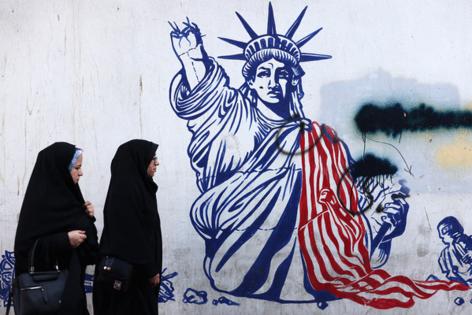Commentary: Trump shouldn't return to maximum pressure on Iran
Published in Op Eds
As President-elect Donald Trump staffs his national security team, speculation is swirling about how the incoming Trump administration will manage some of the most difficult international security problems of the day. While much of the attention thus far has been devoted to the war in Ukraine, the Iranian nuclear issue isn’t far behind on the list of priorities.
Like all of his predecessors dating to President George W. Bush, Trump’s top goal on Iran is straightforward: Prevent Tehran from creating a nuclear weapon. The question is what combination of threats, pressure, concessions and inducements is required to accomplish this objective. According to reports, Trump’s incoming administration is already drafting executive orders that would redouble a previous campaign of maximum pressure, which was designed to cause so much pain to the Iranian economy that Iran’s supreme leader, Ayatollah Ali Khamenei, would be forced to come to the negotiating table on U.S. terms. As one former Trump administration official said days after the election, “Tightening the economic noose around Iran is going to be a day one foreign policy priority to start cleaning up (Joe) Biden’s Middle East mess.”
Trump, however, shouldn’t rush into a policy that proved grossly ineffectual the first time around. Instead, he should cater to his deal-making instincts, which means being pragmatic, leveraging Washington’s diplomatic power and dropping maximalist demands the Iranians have no intention of meeting.
First, it’s important to underscore just how counterproductive the Trump administration’s first attempt at maximum pressure was. In May 2018, Trump withdrew from the Joint Comprehensive Plan of Action, or JCPOA, which temporarily capped Tehran’s uranium enrichment capability and opened up the Iranian nuclear program to international inspections. In its place, Washington reinstated the economic sanctions that were previously lifted and enacted new ones on Iran’s crude oil and Western financial system. Tens of billions of dollars in Iranian foreign reserves were frozen, and Tehran found it increasingly difficult to fund its budget as international investors — including European corporations — pulled out of the Iranian market. Between 2017 and 2020, Iran’s oil exports declined by approximately 75%.
Trump administration officials at the time, from Secretary of State Mike Pompeo to national security adviser John Bolton, insisted that the sanctions were not only having a massive impact on the Iranian economy but also would push Tehran to eventually come to the table. However, the Iranians spurned negotiations and used Washington’s withdrawal from the nuclear deal to expand their nuclear program, both as a form of retaliation and as a way to accumulate more bargaining power in the event of future talks. Iran, which was limited to 3.67% enrichment under the deal, began enriching to 20%. More advanced centrifuges were installed to churn out uranium. At the end of Trump’s presidency, Iran’s total enriched uranium stockpile reached 2,442 kg, more than eight times what Iran possessed before the maximum pressure policy was put into effect. (Today, Iran’s stockpile has increased to 6,604.4 kg.)
Granted, U.S. sanctions clearly had a negative impact on Iran’s wallet. Even so, the Iranians didn’t cave — in fact, they escalated. Cargo vessels carrying crude oil from the Persian Gulf were attacked on numerous occasions. In a particularly audacious attack in September 2019, drones and cruise missiles purportedly linked to Iran struck two of Saudi Arabia’s largest oil refineries, temporarily shutting down about half of the kingdom’s output. The message: If Iran can’t export its oil, then nobody can.
Given this track record, it’s hard to see why Trump would want to give this policy another shot. Some have argued that the circumstances in the Middle East today are more palatable for a maximum pressure campaign than they were in 2018. Iran’s economy, after all, suffers from high inflation and sluggish growth. Iran’s government isn’t exactly popular with the Iranian population. And Tehran’s proxy network has suffered significant blows over the last year, with Israel degrading the military capabilities of Hamas and Hezbollah.
Yet this claim is overconfident to the point of hubris. Unlike in the past, when the Gulf States were supportive of Washington’s get-tough approach toward Tehran, countries such as Saudi Arabia and the United Arab Emirates now want nothing to do with squeezing Iran economically. Ties between Iran and Saudi Arabia, for instance, are far better today than they were five years ago — a consequence of Saudi Crown Prince Mohammed bin Salman’s conclusion that regional stability is necessary if the kingdom’s economic development goals are to be realized. The Saudis and Iranians, who resumed diplomatic relations in 2023, are both working to build their bilateral relationship.
Trump could disregard this development and press ahead, but he would then put himself in an unenviable position: Allow the Gulf States to continue trading with Iran or sanction the Gulf to enforce compliance. The first would water down the impact of U.S. sanctions; the second would sour Washington’s ties with the Gulf and compromise Trump’s attempts to expand the Abraham Accords, considered a significant foreign policy accomplishment of his first term.
There is an alternative policy available. But Trump will have to overrule the advice of his more hawkish advisers, learn the lessons of the past and explore a diplomatic process that will inevitably require U.S. concessions. Iran wants sanctions relief; the U.S. wants Iran to stop producing high-grade uranium enrichment and to fully cooperate with international inspectors. Because Iran’s nuclear program has expanded in the years since, reviving the old nuclear deal is unlikely. A new arrangement is bound to be less comprehensive. But even an imperfect agreement is better than returning to a strategy that not only failed but also made the Iranian nuclear problem even worse.
____
Daniel DePetris is a fellow at Defense Priorities and a foreign affairs columnist for the Chicago Tribune.
___
©2024 Chicago Tribune. Visit at chicagotribune.com. Distributed by Tribune Content Agency, LLC.




























































Comments